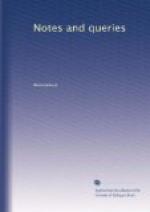If this is a “Note” worth registering, it is much at your service, whilst for a “Query,” I should be very glad to be informed, when a very able review, the date of which I neglected {56} to make at the time, appeared in the Times newspaper, of the 2nd edition of Cottle’s Life of Coleridge.
With many good wishes for the success of your register,
I remain, &c.
JOHN MILAND.
* * * * *
DIBDIN’S TYPOGRAPHICAL ANTIQUITIES.
Sir,—I am very glad to have elicited the information contained in your number just published respecting the copy of Borde’s work in the Chetham Library. As I have a great respect for Mr. Ames, I must remark that he had no share in the blunder, and whenever a new edition of his work is undertaken, it will be well to look rather curiously into the enlargements of Dibdin. In the mean time this information naturally leads to another Query—or rather, to more than one—namely, “Had Mr. Bindley’s copy this unique imprint? and what became of it at the sale of his books? or is it only one of the imaginary editions which give bibliographers so much trouble?” Perhaps some one of your correspondents may be able to give information.
Yours, &c.
S.R. MAITLAND.
* * * * *
QUERIES ANSWERED, NO. 2
MADOC THE SON OF OWEN GWYNED.
The student who confines himself to a single question, may fairly expect a prompt and precise answer. To ask for general information on a particular subject, may be a less successful experiment. Who undertakes extensive research except for an especial purpose? Who can so far confide in his memory as to append his name to a list of authorities without seeming to prove his own superficiality? I throw out these ideas for consideration, just as they arise; but neither wish to repress the curiosity of querists, nor to prescribe bounds to the communicative disposition of respondents.
Did Madoc, son of Owen Gwynedd, prince of Wales, discover America? Stimulated by the importance of the question, and accustomed to admire the spirit of maritime enterprise, at whatever period it may have been called into action, I have sometimes reflected on this debatable point—but can neither affirm nor deny it.




